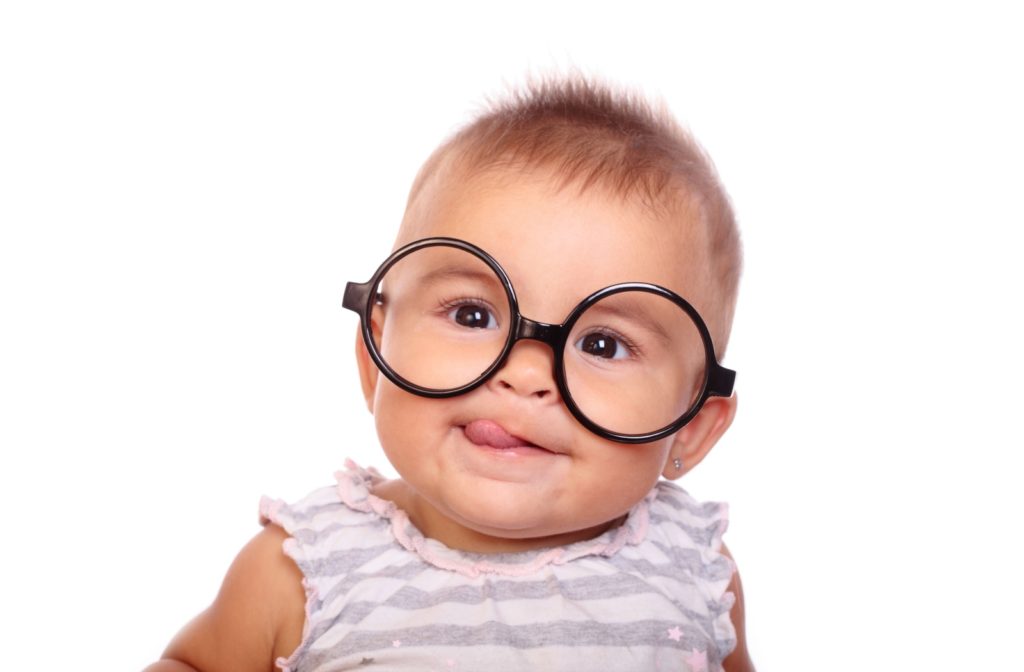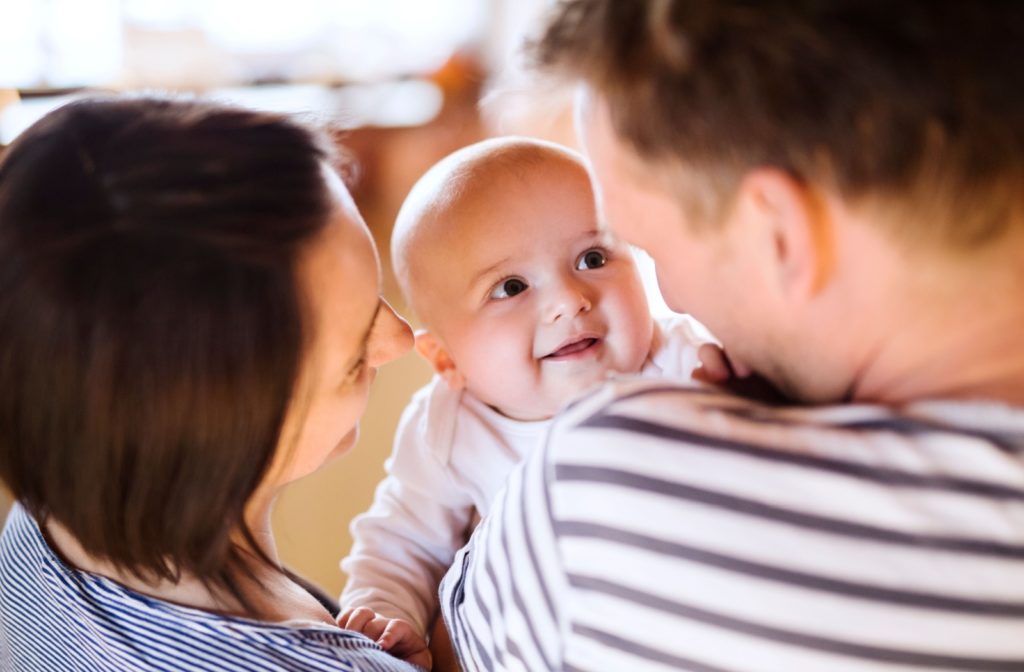Welcoming a new baby into the world is an exciting, joyous occasion filled with countless milestones and heartwarming moments. Among the many responsibilities of parenthood, ensuring your baby’s vision and health are paramount. The first comprehensive eye exams are done around 6 months of age.
If your baby’s vision is underperforming during a pediatric eye exam, optometrists can use specialized tools for infants to determine whether glasses can help. This early detection helps ensure your little one’s eyes are cared for during their critical years as their vision develops.
How Do Babies Get Their Eyes Tested?
Doctors use age-appropriate tests during eye exams to assess babies’ vision. For instance, they may use colorful toys, lights, and patterns to gauge the baby’s ability to track objects, focus, and respond to visual stimuli. These tests are designed to be engaging and non-threatening for the baby, making the experience enjoyable for both the child and the parents.
When Do They Test Babies’ Eyesight?
A first eye examination may occur shortly after birth. A pediatrician or a trained nurse checks for immediate concerns, such as congenital eye conditions. This initial screening helps identify potential issues that may require further evaluation.
Follow-up eye examinations are essential for monitoring children’s visual development. Pediatric ophthalmologists recommend scheduling these visits at regular intervals, typically 6 months, 1 year, and 3 years of age. The doctor will assess the baby’s ability to focus, track objects, and respond to visual stimuli.
Timing is crucial when testing a baby’s eyesight. Early detection of vision problems can significantly affect the child’s development and overall quality of life. These appointments allow doctors to track the baby’s progress and catch emerging concerns early on.
How Do You Test a Baby for Glasses?
When considering eye tests for babies, many parents wonder how professionals can accurately assess vision in those who can’t yet communicate. Pediatric eye specialists utilize various methods and tools designed specifically for infants to provide an accurate diagnosis.
Pediatric eye doctors are trained to handle the unique challenges of testing a baby’s eyesight. They can observe and measure the baby’s eye movements, reactions, and responses to visual stimuli. These experts possess the skills and patience to work with infants and toddlers.
Visual Evoked Potential (VEP) Testing
One of the primary tools used in infant eye exams is the visual evoked potential (VEP) test. This non-invasive test measures the electrical activity in the baby’s brain in response to visual stimuli. By observing the brain’s responses, doctors can determine if your child’s vision is developing correctly.
Retinoscopy
Retinoscopy is another essential method for assessing a baby’s vision. During this procedure, the doctor shines a light into the baby’s eyes and uses a retinoscope to observe the reflection off the retina. This helps determine the eye’s focusing ability and can identify refractive errors such as nearsightedness, farsightedness, or astigmatism.

How Do Babies Wear Glasses?
For parents of babies who require corrective lenses, the idea of getting their little one to wear glasses might seem daunting. However, with the right approach and patience, babies can adapt to wearing glasses and experience the benefits of clear vision.
- Choose the Right Frames: Selecting the right frames helps ensure comfort and compliance. Pediatric opticians offer a variety of frames designed specifically for infants and toddlers. These frames are lightweight and flexible and often come with adjustable straps to keep them securely in place.
- Introducing Glasses Gradually: Introducing glasses gradually can help the baby adapt to wearing them. Start with short periods, allowing the baby to get used to the sensation of wearing glasses. Gradually increase the duration as your child becomes more comfortable.
- Making It Fun: Incorporate play and encouragement to turn wearing glasses into a positive experience. Use colorful, fun frames that your child enjoys, and praise them for keeping the glasses on. Engaging activities, such as reading picture books or playing with toys, can distract children and help make wearing glasses more enjoyable.
How Frequently Should Young Children Have Their Eyes Tested?
Regular eye examinations are essential for monitoring a child’s visual development and promptly addressing any issues.
Early Childhood (Ages 0–3)
Regular eye examinations are crucial during early childhood. Pediatric eye doctors recommend scheduling eye exams at 6 months, 1 year, and 3 years of age. These early checkups help identify and address any potential vision problems that could impact children’s development.
Preschool Years (Ages 3–5)
Once children reach preschool age, annual eye examinations can become routine. These checkups monitor children’s visual acuity, focusing ability, and overall eye health. Detecting and addressing vision problems during this stage can significantly impact children’s learning and social interactions.
School-Age Years (Ages 5 & Up)
Annual eye examinations are essential for school-age children. Regular checkups help ensure that any emerging vision issues are promptly addressed, preventing potential academic challenges and supporting your child’s overall quality of life.
You Can Support Your Child’s Eyes from an Early Age
Monitoring your baby’s vision health is a vital aspect of parenthood. By understanding how eye tests are conducted for babies, the significance of early detection, and the recommended timeline for eye examinations, you can take proactive steps to safeguard your child’s visual development.
We understand how challenging life can be for new parents and strive to make every part of your baby’s eye care accessible and understandable. Contact us today to schedule your baby’s first eye exam or your child’s next eye exam.



